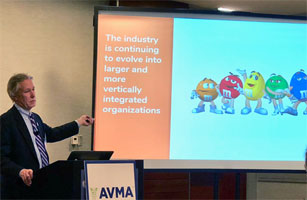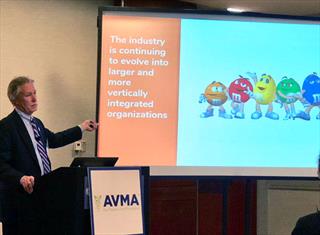

VIN News Service photo
Dr. Doug Aspros, a longtime leader within the American Veterinary Medical Association, told a crowd of veterinarians on Saturday that consolidation is accelerating, and more practices than ever are owned by national companies without a veterinarian at the helm. “It’s different when you’re working for a mentor than it is to work for the Mars family,” he said.
Large corporations that run veterinary practices want a break on the $330 it costs each veterinarian to belong to the American Veterinary Medical Association and discounted rates with the Professional Liability Insurance Trust (PLIT).
If not, national chains such those owned by candymaker Mars Inc., the largest employer of veterinarians in the world, might take their veterinarians and insurance business elsewhere.
"The AVMA PLIT routinely receives requests from national practices regarding AVMA memberships," said Dr. Andrew Clark, chief executive officer of the PLIT, which offers liability insurance, license defense and business insurance policies for veterinarians. The PLIT's insurance offerings are available only to AVMA members, of which there are more than 91,000.
Clark made the announcement Friday during the AVMA Veterinary Leadership Conference in Chicago. Dr. Linda Ellis, a PLIT director, asserted that large corporate practice groups defecting from the AVMA is a real threat.
"Working with some of these national groups at the corporate level, more and more … we're dealing with non-veterinarians who aren't familiar with the AVMA," Ellis told the AVMA House of Delegates. "They're saying, 'We feel we have a right to get some sort of break.' What our fear is … if they don't get feel like they're getting breaks, they will get their insurance somewhere else. So we'll be missing those opportunities … to keep veterinarians in the PLIT family and the AVMA family."
She added, "It's the corporate office level making these requests."
Neither Clark nor Ellis identified a specific company. However, it was widely assumed by delegates that they were referring to Mars-owned Banfield Pet Hospital, the largest practice chain in the United States.
Asked to confirm that Banfield wants a discount on AVMA membership and insurance rates, company spokeswoman Ryan Bartholomew replied by email that "we have no indication or reason to believe anyone at Mars or Banfield approached the AVMA for a discount."
But delegates were quick to identify the company as central to a looming conundrum: As veterinary practice chains grow larger, so do their influence. Where will that leave independent practitioners as their national association wrangles to represent the growing interests of big business as well as those of small, independently-owned clinics?
To help answer that question, House delegates asked the AVMA Board of Directors to "study membership models based on practice size and ownership" and report how they impact member services. The Board is slated to follow up with the House in July, when the group gathers in Denver for the AVMA annual convention.
The prospect of studying the issue appealed to delegates who lament that veterinarians who own a single practice face heavy competition from chain practices that have greater buying power, brand recognition and marketing. What's more, major companies are consolidating. In addition to owning Banfield, Mars sealed a $7.7 billion deal in September to buy VCA, the nation's No. 2 veterinary practice chain. Mars, which also owns the specialty practice chain Blue Pearl and has a number of holdings in the pet food arena, now controls more than 1,900 practices in the United States and Canada.
The reality of competing against big business has independent practice owners such as Dr. Stephen Steep dismayed to learn that the Michigan Veterinary Medical Association and other state associations already have cut Banfield a break on membership dues.
"Our board voted to provide that to them, and I felt cheated," said Steep, Michigan's alternate delegate to the House. His statement prompted applause from the audience.
Delegate Dr. Sandra Faeh noted that the Illinois Veterinary Medical Association also offers group discounts. "So far, Banfield and the (University of Illinois) are the only takers," she said. "The concern is that we're giving a discount to a corporation that can, in theory, afford more than the average practitioner."
Dr. Timothy Fleming, alternate delegate representing Mississippi, posed a hypothetical concern: "If we're to honor the discount, what happens when a group of veterinarians say, 'We're going to consolidate ourselves, and we want the same discount?' Is the AVMA prepared to offer bulk discounts to all these groups?"
Other delegates expressed concerns that veterinarians who serve as staff at major corporations could one day drive the agenda of the AVMA, provided they all become members. But Dr. Melanie Mardsen, a delegate representing Colorado, posited that state organizations in particular need more energy and talent, and therefore should do what it takes to attract and retain members.
"We do offer a large corporate discount," she said of the Colorado Veterinary Medical Association. Prior to doing so, 15 percent of Banfield practitioners were members. "Now we have 85 percent," she said.
Dr. Ernest Godfrey, a delegate representing Florida, agreed: "It's hard to swallow, but we need involvement from as many veterinarians as we can get, and this is one way to do it."
Dr. Michael Ames, a delegate representing Arizona who runs a crematory business, asked all Banfield veterinarians in the audience to raise their hands. A smattering of people did. Ames observed: "I would say that in 10 years, if that question is asked again, we'll see a lot more hands raised. The number of my clients who've converted to national practices over the last three years is absolutely stunning."
Dr. Neil Moss, a delegate representing Utah, also predicts a future with little independent practice. "When I retire, as have many of the veterinarians in my area, if we can't find someone to buy the practice, we're probably going to sell to a corporation," he said.
"It's a change in the landscape that's unavoidable," he added.
'Veterinarians are a cost of business'
Dr. Doug Aspros echoed that sentiment during a talk he gave following the House's adjournment Saturday. The former AVMA president and board member has owned two veterinary practices in Westchester County, New York, and co-owned others. He now works as chief veterinary officer for Veterinary Practice Partners. The company, which co-owns practices in partnership with veterinarians, is involved in 25 practices across the country.
He warned that Mars is "changing the profession in a very big way."
"A third of all practices of size are run by Mars. They have a lot to do with how this profession will develop over time," he stated.
Privately owned, Mars is not subject to the public reporting of assets. In addition to owning about 1,000 Banfield practices in North America and Puerto Rico, Mars' veterinary hospital portfolio includes 779 VCA practices and 60 specialty and emergency clinics with BluePearl. Mars also owns 58 practices that came with its 2016 purchase of PetPartners.
"They're vertically organized," Aspros observed. "I'm surprised they haven't bought a distributor or drug company yet."
They're also beholden to business executives, not veterinary professionals: "If you're hiring veterinarians as a corporation, veterinarians are cost of doing business," he asserted.
Aspros warned that national corporations care more about business profits than the veterinarians they hire. "Corporations aren't graduates of your alma mater; they don’t share your experiences. Corporation executives don’t have your college logo tattooed on their backside," he said. "They offer benefits because their employees see them as value. That's it."
Aspros stated that as Mars-employed veterinarians enter organized veterinary medicine in greater numbers, the AVMA could be forced to reckon whether it exists to serve individual members or the profession as a whole, given that the interests of private and corporate practices can and do conflict. "I know the AVMA has struggled with this," he said.
AVMA officials did not share the percent of its membership comprised of national or regional practice chain employees.
"Keeping a sense of community is more and more challenging," Aspros said. "... The fundamental dilemma for the AVMA is ... who's our member? Until you answer that question, you can’t set up a dues structure that reflects that."
Editor's note: This article was amended to clarify discussions involving Banfield by AVMA officials and delegates.